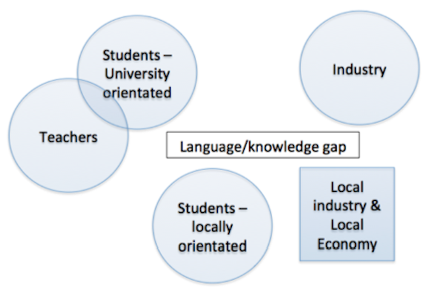Enhancing aspirations for STEM careers in rural, regional and remote communities
Team Members
Assoc Prof Philip Roberts (Chief Investigator)
Funding Organisations
- Department of Education and Training, Higher Education Participation and Partnerships Program - National Priorities Pool.
Project Timeline: October 2016 – March 2018
This project explored the relationship between rural students’ knowledge of STEM in rural careers, their aspirations towards STEM careers, subject choices and university admission.
Rural students often have less access to STEM subjects in senior secondary school, a situation that in turn limits their ability to gain entry to university study. The project had a particular focus on how the nexus between aspirations and understanding of rural STEM careers influences senior school subject selection, which in turn impacts upon subsequent university study. Through understanding the needs of the rural sector related to STEM and innovation, and students' perceptions of rural industry, we were able to sketch the beginning of a strategy for highlighting the relevance of STEM to rural careers and innovation that can be used to encourage students to take relevant STEM subjects in their senior studies and, subsequently, at university.
This project has involved a national survey of students, teachers, parents and community members of their understandings of the link between school subjects and rural industry STEM careers. This was followed by interviews and focus groups around the nation with industry groups, as well as multiple focus groups with students in rural schools, in order to explore these issues in greater detail.
The project identified a lack of understanding of the nature of modern rural industries by many students and teachers in rural schools. Consequently, many students and teachers did not understand the relationship between school subjects and careers in modern rural industries. Instead teachers, and university aspirant students, used the language of academic disciplines.
Similarly, rural industry leaders did not understand the language of school subjects, and consequently were not able to draw a link between their industry needs and the subjects that students study at school. In bringing this together, the project illustrated a significant language gap between students wanting to pursue rural careers, teachers, and rural industries.
Publications
- Roberts, P., (2018). Enhancing Aspirations for STEM Careers in Rural, Regional and Remote Communities. Higher Education Participation and Partnerships Programme (HEPPP) 2016 National Priorities Pool Final Report. https://www.ncsehe.edu.au/project/enhancing-aspirations-stem-careers-rural-regional-remote-communities/?sort_by=title&sort_order=ACS&search=&project_year_args=&project_equity_group_args=&project_framework_classification_args=&price_range_min=0&price_range_max=2000000&project_lead_university_args=55&project_lead_university16=on.
- Austin, K., O'Shea, S., Groves, O., Lamanna, J., Roberts, P., Poretti, L., & Downes, N. (2020). Find your future focus: A place-based career-education program for high-school students. University of Wollongong Press. https://documents.uow.edu.au/content/groups/public/@web/@dvce/@in2uni/documents/doc/uow268055.pdf
- Best-practice career education for students from low socioeconomic status backgrounds: Pilot Program 4 Resources. https://documents.uow.edu.au/content/idcplg?IdcService=GET_FILE&dDocName=UOW269288&RevisionSelectionMethod=latestReleased
- Groves, O., Austin, K., Cull, N., Poretti, L. & Roberts, P. (2021). Best practice career education for middle-school students from low socioeconomic backgrounds: Two case studies. Disrupted futures: International lessons on how schools can best equip students for their working lives OECD 27-29 October 2021 (online conference). https://www.ncsehe.edu.au/2021-oecd-conference-careers-information/
Related Projects
- Higher education career advice for low SES and rural students
- Access, achievement and the spatial distribution of curriculum in senior secondary schooling
- ARC DECRA: Engaging rural knowledges for sustainable futures: spatial justice and rural schooling
- The sociocultural experiences of rural students at university
- Workforce motivations and incentives for rural professionals
- Rural Professional Practice
For further information on this project, please contact us.

